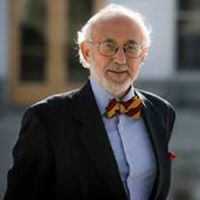A Template for Peace

LEGEND HAS IT THAT Samuel Colt, the venerable U.S. arms manufacturer, engraved this advice on one of his 19th Century revolvers: “Be not afraid of any man no matter what his size; when danger threatens call on me and I will equalize.” This advice would be equally at home today on North Korea’s nuclear weapons, which have neutralized America’s ability to dictate terms to one of the smallest and poorest states on earth.
[ GALLERY: Editorial Cartoons on North Korea ]
Kim Jong Un, the North Korean leader, is convinced that the United States is determined to force regime change in North Korea. And, he is convinced the only way his small country can stop the United States from overthrowing him is for North Korea to have nuclear weapons and intercontinental ballistic missiles to bomb American cities. A capability, that it now seems to possess. Equally, the possession of nuclear weapons and long range delivery systems by North Korea poses a clear and existential threat to the United States, which the superpower cannot let stand. It is a checkmate of frightening, and nightmarish proportions.
Can anything be done to avoid the headlong rush into catastrophe?
The 1962 Cuban Missile crisis offers a template to move the North Korea-U.S. crisis off dead center. The compromises then negotiated between U.S. President John F. Kennedy and Soviet Premier Khrushchev to end that deadly standoff could serve as a model today for negotiations between President Donald Trump and North Korea.
The Cuban Missile Crisis began when an American U-2 spy plane discovered that the Soviet Union was secretly building nuclear missile sites in Cuba, barely 90 miles from America. Missiles that close to the United States would let the Soviet Union launch a nuclear attack on America with little warning to organize an American response. Soviet nuclear missiles in Cuba would be, the Kennedy administration concluded, a nuclear dagger at the American jugular.
President Kennedy responded by going public about the Soviet threat and threw a naval blockade around Cuba. No one knew how the Soviets would react to a naval blockade against its Cuban ally. It was an unprecedented confrontation between the two nuclear armed superpowers, armed with enough nuclear weapons to destroy life on earth. For 13 tense days the world held its breath. Fortunately, the leaders of both superpowers, recognizing the devastating consequences of a nuclear-war, and publicly agreed to a deal in which the Soviets would dismantle their Cuban weapons’ sites in exchange for a pledge from the United States not to invade Cuba.
But in a far more important separate deal, which remained secret for more than twenty-five years, the United States also agreed to remove its nuclear tipped Intermediate Range Ballistic Missiles, (a component of the America’s containment strategy against the Soviet Union,) from Turkey, an important NATO member.
Perhaps a similar twin track public/secret deal would work to diffuse the North Korean crisis: In exchange for North Korea’s destruction of its ICBMs, and a pledge to forgo any future nuclear weapons tests, the U.S would publicly pledge to forgo any attempt to overthrow the Kim’s regime, cease joint naval exercises with South Korea, and for now, allow North Korea keep its stock of nuclear weapons.
The secret part of the deal might include an agreement to withdraw, say a third of the 22,000 U.S. troops presently based in South Korea and pledge to remove most of the remainder on a mutually acceptable timetable, which itself would be linked to progress towards the destruction of most of North Korea’s missiles.
Turkey protested vehemently to the secret deal but in time recognized that America’s vital national interests had to be accommodated. Likewise, South Korea, a key U.S. ally, would fume in the short term, but, I believe, remain an American ally in the long term.
By accepting North Korea as an equal in negotiations and by using the Cuban Missile Crisis as a template, Trump could well reach an agreement to avoid a potential global catastrophe while successfully neutralizing the nuclear threat from North Korea. Trump would go down in the history books as having done something that has eluded every U.S. president since Ronald Reagan was elected in 1980. It is worth a shot!

